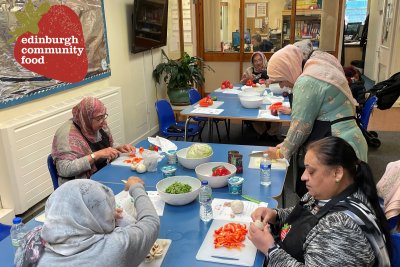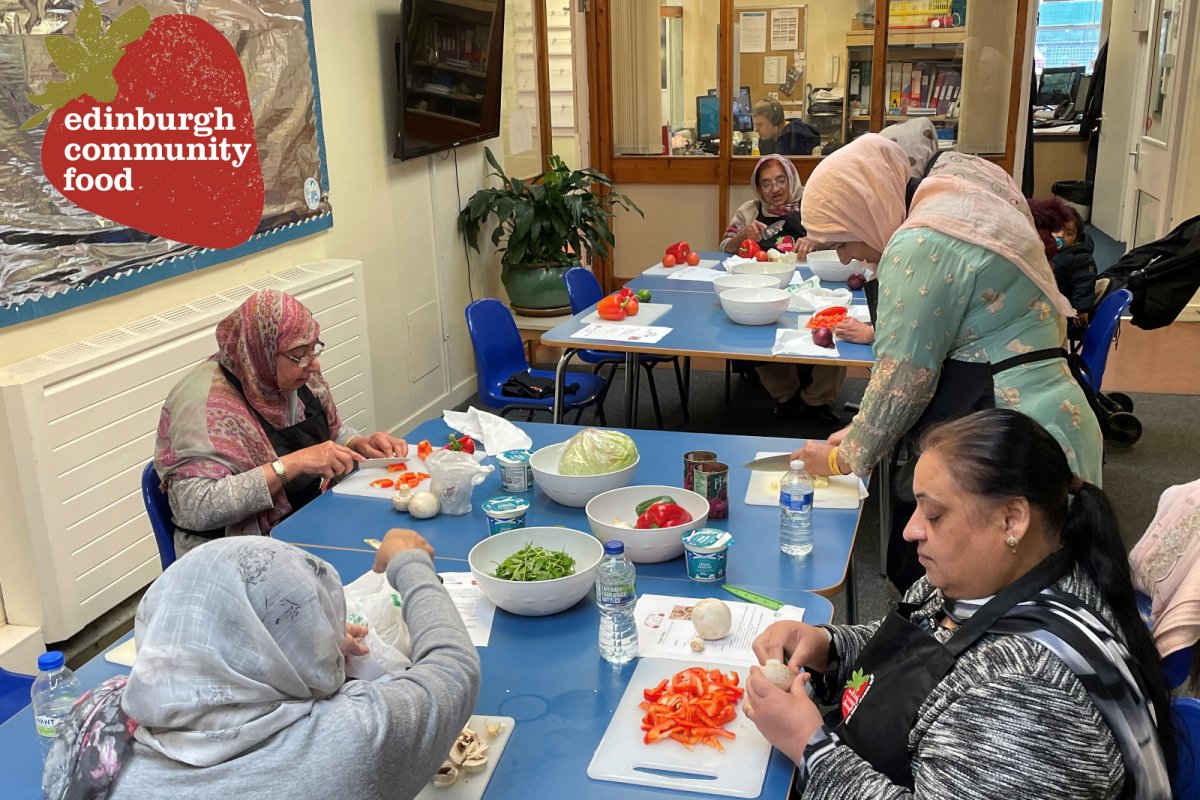 Women preparing food. Credit: Edinburgh Community Food
Women preparing food. Credit: Edinburgh Community Food
From communities up: Working together to create a healthier future for all
In this week’s Recipe for Change guest blog, Jo Howie, from Edinburgh Community Food, talks about the opportunity we have to work together to improve the food we eat, from community level participatory approaches, to national policies such as food and drinks levies.
After years of increasing life expectancy in the UK followed by a decade of stalling, worryingly, we are now seeing our life expectancy starting to fall. Our health is worsening despite public health messaging, education and campaigns. People are now dying younger, spending more of their life in ill-health, and the gap in life expectancy between the poorest and richest in our society is growing.
So why is this so difficult for us? Whose business is it to get involved?
Health inequalities are widening due to a combination of factors including poverty, poor housing, social isolation, the environment, life experiences and lifestyle behaviours. We should all be able to access affordable, nutritious food, no matter where we live. However, we know that healthier food options are often unaffordable and inaccessible for so many of us. When it comes to lifestyle, it is unrealistic and unfair, due to societal pressures, to think that individuals can fix this alone. Protecting our and our children’s future health should be everyone's business.
The Challenge
Our food environment is such that we are bombarded with marketing and promotions from food retailers whose profits largely come from products high in fat, sugar and salt - around 70% of which are aimed at children. It seems that profits are more important than the health of our nation. There are more and more fast-food chains and convenience stores popping up in our high streets and surrounding our schools offering mostly unhealthy food and drink choices. It is so easy to use an app to order fast food home deliveries.
If we do nothing, what health outcomes do our future generations face? We need to make the healthier option the easier, and crucially, affordable option too. Policies must be put in place to limit the food and retail industry’s production and promotion of foods and drinks that are high in fat, sugar and salt.
The Opportunity
It’s not all doom and gloom! At a national level, we have seen that when manufacturers are encouraged to reformulate their recipes, it’s had a positive impact on reducing sugar, salt and fat consumption, and ultimately a positive impact on population health. The sugary drinks tax is an excellent example of this.
In Scotland, we hope that the Good Food Nation Act paves the way to a better future where people can easily make healthier food choices. However, we need important long-term changes to our food system to make this a reality.
Edinburgh Community Food has 27 years of experience of food systems and food interventions throughout the life cycle - we know it will require a sustained whole system approach with all stakeholders playing their part to enact real change. With national funding, cities – and surrounding areas - have the power to transform our food system. They are close to their communities and can use a participatory approach to developing solutions that can be implemented on the ground to tackle issues such as access to affordable food, healthy diets, food waste and climate change.
“A lot of the food system challenges that need to be addressed can be addressed at the city, municipal, urban level. Cities have it within their grasp to do something about these issues.”
Corinna Hawkes, Director of the Division of Food Systems and Food Safety at FAO (Food and Agriculture Organisation of the United Nations).
These solutions should go hand in hand with Government policies to encourage healthier food production in the first place. This is why we support the Recipe for Change campaign asking the UK Government to follow on from the sugary drinks tax to introduce a new levy on unhealthy foods.
To achieve a healthier future for all, change will require a whole system approach.
Edinburgh Community Food (ECF) has 28 years’ experience addressing health inequalities across all localities in Edinburgh and improving access to affordable, healthy foods. We support vulnerable and low-income communities through our Food and Health Development and Promotion work, including cooking and nutrition courses, health information presentations and delivery of Royal Environmental Health Institute of Scotland accredited courses.
Children's Food Campaign: Better food and food teaching for children in schools, and protection of children from junk food marketing are the aims of Sustain's high-profile Children's Food Campaign. We also want clear food labelling that can be understood by everyone, including children.
Sustain
The Green House
244-254 Cambridge Heath Road
London E2 9DA
020 3559 6777
sustain@sustainweb.org
Sustain advocates food and agriculture policies and practices that enhance the health and welfare of people and animals, improve the working and living environment, promote equity and enrich society and culture.
© Sustain 2024
Registered charity (no. 1018643)
Data privacy & cookies








